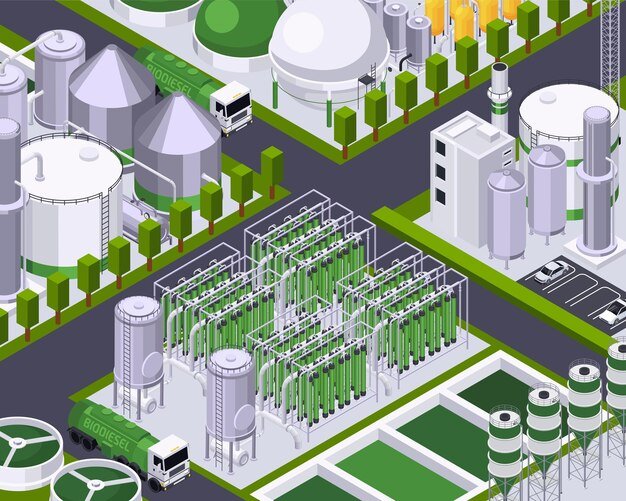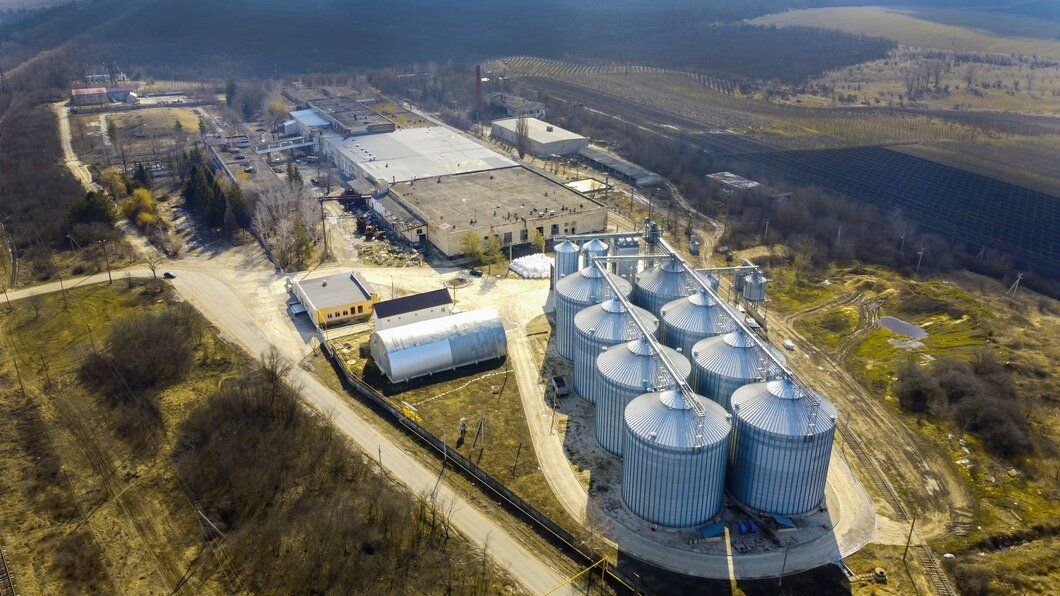How Does a Commercial Biogas Plant Work? A commercial biogas plant offers a sustainable solution to the ever-increasing and most talked-about global demand for renewable energy.
This process is instrumental in converting organic waste into high-utility biogas. Biogas can be used for several purposes. It can be deployed as a mainstream energy source for various purposes like electricity, heating, or fuel.
The ever-increasing focus on different sources of sustainable energy has indeed propelled the development of innovative technologies like commercial biogas plants.
By adopting the winning approach of transforming biodegradable materials into high-utility biogas, they offer a much cleaner alternative to the conventional alternative to fossil fuels.
In this blog, we aim to discuss how all of these specific facilities operate, focusing on their process, design, & significance in addressing the various environmental & energy challenges.
What is a Commercial Biogas Plant
A commercial biogas plant is a strategically designed system by experts in this sector for biogas production for commercial use. The process of digestion in the absence of oxygen breaks down the organic waste that is fed into the plant.
Through the characteristic process of breaking down all the organic waste, the result is the production of biogas (a characteristic mixture of methane & carbon dioxide) & digestate which is a fertilizer rich in nutrients.
Different kinds of common feedstocks include food waste, agricultural residues, & industrial organic byproducts.

These plants have proved to be an integral requirement for substantial development in the energy sector, addressing the energy production & waste management requirements in tandem.
How Does a Commercial Biogas Plant Work?
How Does a Commercial Biogas Plant Work? Understanding the overall structure of a biogas plant for commercial use is very essential to grasp its functionality.
Below-mentioned are the critical components of a commercial biogas plant.
- Feedstock Storage & Pre-processing
- Purpose – Stores & prepares organic materials for digestion.
- Procedure – Materials are sorted, shredded, & sometimes heated to enhance efficiency.
- Mechanism – Different kinds of feedstocks like crop residues, animal manure, & food waste are collected. They are transported to the commercial biogas plant with the help of proven mechanisms. All of these materials, then undergo preprocessing to remove all the unwanted contaminants & optimize their biodegradability.
- Anaerobic Digesters
- Purpose – It is the main unit where digestion in the absence of oxygen takes place.
- Design – Large, sealed tanks deprived of oxygen.
- Function – Microorganisms break down various organic matter, thus producing ample amounts of biogas.
- Mechanism – The organic materials are first pre-processed. Then the same is fed into large anaerobic digesters that are specially designed. Here, the microorganisms play a primary role in decomposing and breaking down all the organic matter in an oxygen-devoid environment. The result is the production of a gas that is highly rich in methane & digestate.
- Storage of Gas & Cleaning System
- Purpose – It collects & purifies the biogas.
- Process – It efficiently removes all the kinds of present impurities like water vapor & hydrogen sulfide.
- Mechanism – The raw biogas is then cleaned to remove several impurities, ensuring optimal energy application performance. The gas is then stored in gas holders or directly supplied for usage.
- Combined Heat and Power Units
- Purpose – The usage of the same is highly instrumental in converting biogas into the most usable form of energy for the welfare of mankind. For instance, biogas is converted into electricity or heat.
- Mechanism – In the process of commercial biogas production, the purified biogas is systematically converted into various forms of usable energy like heat, electricity, or fuel utilizing CHP units or other technologies.
- Digestive Storage
- Purpose – The process involved in biogas production gives rise to nutrient-rich byproducts. The byproducts that are produced can be well-used as an organic fertilizer.
- Mechanism – The end product, referred to as digestate after the process of biogas production is over, is rich in nutrients & is often used as a high-quality organic fertilizer. It is useful in various agricultural and gardening initiatives. Thus, it tends to close the loop in the agricultural ecosystem.
Benefits of Commercial Biogas Plants
- Sustainable Management of Waste
Biogas plants offer the most effective solutions for the processing of organic waste. It reduces our dependency on landfills.
- Renewable Production of Energy
With the production of biogas, these plants contribute quite significantly to the generation of renewable energy.
- Environmental Benefits
The setting up of commercial biogas plants reduces the emission of greenhouse gases considerably and mitigates the release of methane from unmanaged waste.
- Economic Gains
The setting up of commercial biogas plants generates revenue through the production of fertilizer and energy. It also reduces the costs associated with waste disposal for businesses.
Real-world Applications of Commercial Biogas Production
Commercial biogas plants serve a diverse range of industries which include the following:
- Food Processing Industry
Processes various food waste very efficiently and, at the same time, contributes largely to meet the energy demands.
- Agriculture
Farmers benefit from the processes of energy production & nutrient cycling. It makes the farming operations much more sustainable.
- Energy Utilities
Energy companies incorporate biogas into the grid, promoting renewable energy largely.
- Municipal Waste Management
City authorities largely authorities utilize biogas plants to handle large volumes of organic waste from institutions and households very effectively.
Challenges with Commercial Biogas Plant Operations
Despite offering several benefits, operating a biogas plant for commercial use comes with several challenges which include the following:
- Consistency in Feedstock Supply – It is witnessed that the availability of organic waste varies from time to time. This can considerably affect the operations of commercial biogas plants.
- Initial Costs of Investment – A considerably high capital investment for setting up the plant can prove to be a barrier.
- Technical Expertise – The availability of skilled personnel to manage & plant operations can become a challenge at times.
The Future of Commercial Biogas Plants
The entire globe is transitioning towards adopting renewable energy. This positions commercial biogas plants as vital players in the booming energy sector of today’s time.
New technological innovations in the field of feedstock utilization are making the processes more efficient and the integration with other renewable technologies are considerably shaping the future of biogas.
Northamps has evolved as a pioneer in renewable energy technologies. We are at the forefront of advancing biogas plant solutions for commercial use.
Our expert team’s proven expertise ensures optimal efficiency, sustainability, and scalability in biogas projects. By collaborating with us, several businesses can effectively harness the best commercial biogas production practices to meet their environmental and energy goals.
Conclusion
Commercial biogas plants like Northamps have become dependable sources of sustainable energy systems. We address the management of waste and energy production in a single process.
By efficiently leveraging the various advancements in the field of technology, several businesses can adapt our services to achieve environmental and economic goals effectively. Investing in biogas can likely reduce operational costs. This would strengthen a company’s commitment to sustainability.
It is high time to start your journey towards adopting renewable energy and explore the high transformative potential of a professionally set up commercial biogas plant. Give us a buzz for more details and a free consultation!


